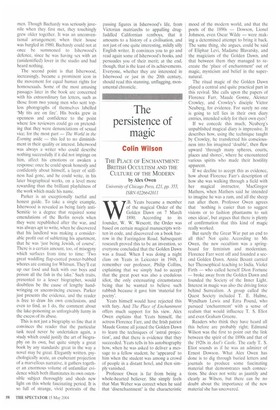The persistence of magic
Colin Wilson
THE PLACE OF ENCHANTMENT: BRITISH OCCULTISM AND THE CULTURE OF THE MODERN by Alex Owen University of Chicago Press, £21, pp. 355, ISBN 0226642011 w.B. Yeats became a member of the magical Order of the Golden Dawn on 7 March 1890. According to its founder, W. W. Wescott, the Order was based on certain magical manuscripts written in code, and discovered on a book barrow in the Farringdon Road. Subsequent research proved this to be an invention, so everyone concluded that the Golden Dawn was a fraud. When I was doing a night class on Yeats in Leicester in 1948, I remember our professor, Philip Collins, explaining that we simply had to accept that the great poet was also a credulous idiot, the only extenuating circumstance being that he wanted to believe such rubbish because it gave him 'material for poetry'.
Yeats himself would have rejected this with fury. And The Place of Enchantment offers much support for his view. Alex Owen explains that Yeats himself, the actress Florence Farr, and the Irish patriot Maude Gonne all joined the Golden Dawn to learn the techniques of 'astral projection', and that there is evidence that they succeeded. Yeats tells in his autobiography how, when he was asked to deliver a message to a fellow student, he 'appeared' to him when the student was among a crowd of people in a distant hotel, and then simply vanished.
Professor Owen is far from being a whole-hearted believer. She simply feels that Max Weber was correct when he said that 'disenchantment' is the characteristic mood of the modern world, and that the poets of the 1890s — Dowson, Lionel Johnson, even Oscar Wilde — were making a determined attempt to bring it back. The same thing, she argues, could be said of Eliphaz Levi, Madame Blavatsky, and the magicians of the Golden Dawn, and that between them they managed to recreate the 'place of enchantment' out of magic, mysticism and belief in the supernatural.
The ritual magic of the Golden Dawn played a central and quite practical part in this revival. She calls upon the papers of Florence Farr, Maude Gonne, Aleister Crowley, and Crowley's disciple Victor Neuberg, for evidence. For surely no one is going to tell lies in their own diary entries, intended solely for their own eyes?
If we concede this much, Neuberg's unpublished magical diary is impressive. It describes how, using the technique taught by Crowley, he transferred his consciousness into his imagined 'double', then flew upward 'through many spheres, courts, places and shores', where he encountered various spirits who made their hostility apparent.
If we decline to accept this as evidence, how about Florence Farr's description of how she was walking through a field with her magical instructor, MacGregor Mathers, when Mathers said he intended to imagine he was a ram, and all the sheep ran after them. Professor Owen agrees that 'nothing is easier than to suggest visions or to fashion phantasms to suit ones ideas', but argues that there is plenty of confirmation that this kind of magic really worked.
But surely the Great War put an end to all this? Not quite. According to Ms Owen, the new occultism was a springboard for feminism and modernism. Florence Farr went off and founded a second Golden Dawn. Annie Besant carried her Theosophical teaching to India. Violet Firth — who called herself Dion Fortune — broke away from the Golden Dawn and founded the Society of the Inner Light. Interest in magic was also the driving force behind Surrealism. A group called the Quest Society included T. E. Hulme, Wyndham Lewis and Ezra Pound, who pursued 'enchantment' with a sense of realism that would influence T. S. Eliot and even Graham Greene.
Readers who think they have heard all this before are probably right; Edmund Wilson was the first to point out the link between the spirit of the 1890s and that of the 1920s in Acel's Castle. The early T. S. Eliot sounds as if he was an admirer of Ernest Dowson. What Alex Owen has done is to dig through buried letters and journals to produce some fascinating material that demonstrates such connections. She does not write as jauntily and clearly as Wilson, but there can be no doubt about the importance of the new material she has uncovered.


































































































 Previous page
Previous page